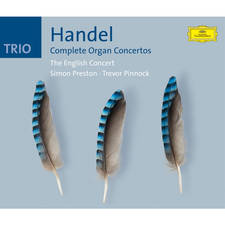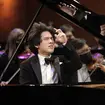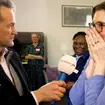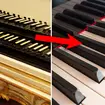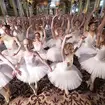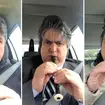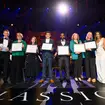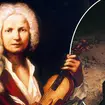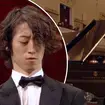The Full Works Concert - Thursday 3 July, 8pm
Walton, Bach and Brahms prepare the way for Haydn’s magnificent Nelson Mass in a brilliant recording by the Monteverdi Choir and English Baroque Soloists under Sir John Eliot Gardiner.
Tonight's Concert opens with the Spitfire Prelue and Fugue by William Walton. For Walton, movies were his bread and butter. He had been asked to write the music for The First of the Few, a wartime flag-waving, morale-boosting movie on the subject of the Supermarine Spitfire, directed by and starring Leslie Howard. The film came out in 1942, and the Spitfire Prelude and Fugue - which Walton drew from the score - was premiered by the Liverpool Philharmonic Orchestra, at Philharmonic Hall the following January.
In the spring of 1721, Bach was contemplating changing jobs and, after a chance meeting with the Margrave of Brandenburg, Bach sent him a set of six concertos that he had already written - possibly as a kind of audition. The Margrave appears to have completely ignored the gift and the set were discarded in his library until his death in 1734. They were found in the Brandenburg archives during the 19th century. Brandenburg Concerto No. 1, which we will hear tonight, is the only one with four movements, and prominently features the horns and oboes.
The Double Concerto in A minor by Johannes Brahms was the composer's final orchestral work, written for the cellist Robert Hausmann and Brahms' old but estranged friend, the violinist Joachim. The concerto was, in part, an attempt to make up with Joachim after Joachim's divorce, a dispute in which Brahms sided with Mrs. Joachim. Clara Schumann was not a fan of this concerto, considering it 'not brilliant for the instruments', but it has become more popular in recent times.
The "Mass for troubled times" or "Nelson Mass" is one of 14 masses written by Joseph Haydn and has been described as arguably his greatest single composition. In 1798, Haydn's world was in turmoil; Napoleon had won four major battles with Austria in less than a year. What Haydn did not know when he wrote it, but what he and his audience learned probably on the night of its première, was that Napoleon had been dealt a stunning defeat in the Battle of the Nile by British forces led by Admiral Nelson. Because of this coincidence, the Mass gradually acquired the nickname "Lord Nelson Mass". The title became indelible when in 1800, Lord Nelson himself visited the Palais Esterházy, accompanied by his British mistress, Lady Hamilton, and may have heard the Mass performed.
William Walton: Spitfire Prelude and Fugue
Paul Daniel conducts the Orchestra of Opera North
Johann Sebastian Bach: Brandenburg Concerto No.1 in F major BWV.1046
Rinaldo Alessandrini conducts Concerto Italiano
Johannes Brahms: Double Concerto in A minor Opus 102
Violin: Vadim Repin
Cello: Truls Mork
Riccardo Chailly conducts the Leipzig Gewandhaus Orchestra
Joseph Haydn: Mass No.11 in D minor Hob.XXII:11 ‘Nelson’
Soloists: Donna Brown, Sally Bruce-Payne, Peter Butterfield, Gerald Finley
John Eliot Gardiner conducts the English Baroque Soloists and Monteverdi Choir
